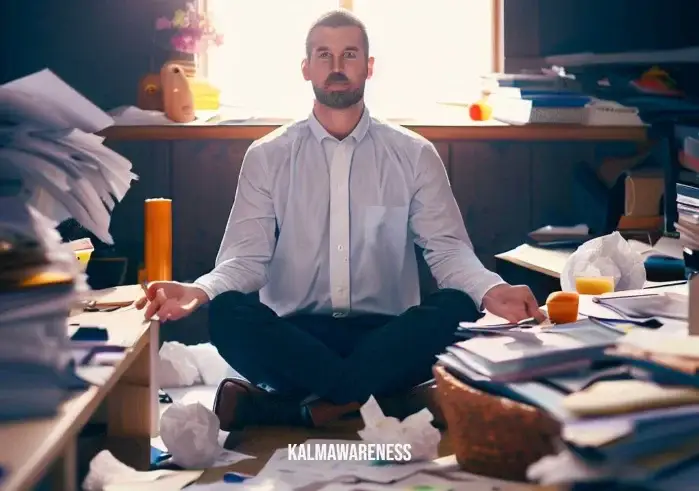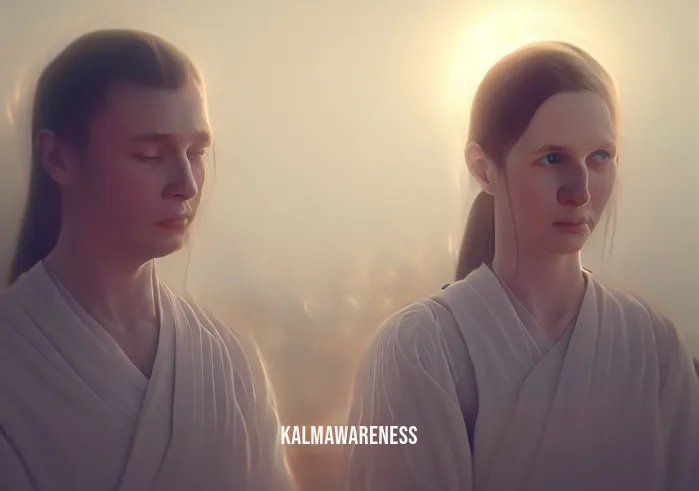Ending The Day With Gratitude: A Key To Better Living
“Gratitude makes sense of our past, brings peace for today, and creates a vision for tomorrow.” – Melody Beattie
We have all experienced those rollercoaster days, days filled with ups and downs, twists and turns, peaks and valleys. When the day ends, we often find ourselves going over all the things that didn’t quite go according to plan. This process, although normal, doesn’t leave room for reflection, appreciation, or the feeling of contentment that is necessary for positive mental health. What if there was a way to turn that tide, to end each day on a note of positivity and fulfillment, to end the day with gratitude?
The Concept of Gratitude
Gratitude – a term we often hear, yet rarely take the time to truly understand or embody. The concept of being grateful for everything is much more than a simple thank you. It is a profound appreciation for the blessings in our lives, large or small. It’s about shifting our focus from what’s missing to the abundance that already exists.
The Power of Gratitude in Personal Growth
Recognizing and expressing gratitude has been linked to significant improvements in our overall well-being and happiness. Researchers have found that the practice of gratitude is a powerful catalyst for personal growth, enhancing our emotional and mental strength. When we learn to recognize the good in our lives, we start to cultivate joy, even in situations where joy seems short.
Ending the Day With Gratitude
So, how can you integrate this powerful practice into your everyday life? How can you end the day with gratitude?
Start by setting aside a few moments at the end of each day to reflect on what went well, what brought you joy, or what you learned. This is a time for quiet reflection and inner peace. This practice, known as evening meditation, can provide the space for such a review.
To begin, find a quiet, comfortable spot. Allow yourself to sit in silence for a few minutes, focusing on your breath. This breathing meditation helps to clear your mind and prepares you for reflection.
Next, reflect on your day, starting from the morning. Acknowledge both the pleasant and challenging parts of your day. Pay close attention to the people, moments, or things that brought you some form of joy or contentment. Take a moment to express your gratitude for these things.
You could express this gratitude in various ways: you could say it out loud, write it in a body gratitude list, or simply hold the thought in your mind. The most important part is to genuinely feel the gratitude in your heart.
The Transformative Effect of Gratitude
Adopting a practice to end the day with gratitude has a transformative effect on our lives. This practice can help you find contentment amidst the chaos of everyday life. It shifts your focus from what you lack to the abundance that you have. It helps to cultivate the habit of being grateful and allows you to see the world from a perspective of appreciation and abundance.
We invite you to continue this enlightening journey in the next part of this article. We will explore more deeply how ending the day with gratitude can lead to a more fulfilled life and provide you with practical exercises to implement this practice. We will also delve into the benefits of gratitude in promoting positivity and emotional well-being, and the scientific studies that back these claims. Stay tuned to deepen your understanding of this powerful practice and transform your daily routine.

The Benefits of Gratitude: Why Ending the Day with Gratitude Matters
When we consistently end the day with gratitude, we may not realize the profound impact it has on our lives beyond simply feeling better in the moment. Numerous scientific studies have revealed how this daily practice benefits our mental, physical, and social well-being.
Gratitude and Your Mental Health
A consistent gratitude practice has been linked to improved mental health and increased overall happiness. It has a powerful effect on our mindset, contributing to a positive outlook on life. Gratitude helps us focus on the positive aspects of our lives, decreasing negative emotions like envy, resentment, and regret.
Moreover, the practice of gratitude has been found effective in alleviating symptoms of depression and anxiety. By acknowledging the good, we can reduce feelings of worry and stress, allowing us to better manage our emotional well-being. If you’re feeling overwhelmed, a simple breakup meditation or even 5 minutes of silence can help refocus your mind towards gratitude.
Physical Benefits of Gratitude
Gratitude also impacts our physical health. Studies have shown that individuals who express gratitude regularly experience fewer aches and pains and generally feel healthier. This positive outlook can encourage a healthier lifestyle, promoting habits like regular exercise, balanced diet, and adequate sleep. More than that, those who practice gratitude report better sleep quality. This is primarily because expressing gratitude before bed reduces worrying thoughts, helping us settle in for a peaceful sleep.
Social Benefits: Improving Relationships
Gratitude also plays an integral role in social situations. Expressing appreciation can help build new relationships and strengthen existing ones. By recognizing the kindness and generosity of others, we cultivate positive connections and foster mutual respect. Gratitude is an expression of love, making our interactions more meaningful and fulfilling.
Practical Ways to End the Day with Gratitude
With the understanding of the benefits of gratitude, how can we effectively practice it in our daily lives? Here are some practical ways to incorporate gratitude into your evening routine.
Gratitude Journaling
One of the most effective methods to cultivate gratitude is through journaling. This could be as simple as writing down three good things that happened during your day before you go to sleep. Remember, no blessing is too small to make it onto your list. Over time, you’ll notice that even on the toughest days, you can still find something to be grateful for. To make this process even more fulfilling, you can consider personal growth quotes for a dose of inspiration.
Gratitude Meditation
Practicing gratitude meditation at the end of the day can help you focus on the positive aspects of your life. During this practice, you bring to mind the things, people, or events you are grateful for, allowing the feelings of gratitude to fill your heart and mind. By shifting your attention to the present moment, you can see the blessings you have right now and foster a deeper sense of appreciation.
Expressing Gratitude to Others
Take some time to express your gratitude to others. This could be in the form of a message, call, or personal conversation. Letting someone know how much you appreciate them can not only improve your relationship with them but can also boost your own feelings of gratitude and happiness.
To conclude, ending the day with gratitude is a powerful practice that can transform our lives in many ways. It shifts our focus to the positive, making us more resilient and content.
We invite you to continue to the next part of this article, where we will delve into the science behind gratitude, explore further the concept of appreciation and contentment, and discuss some common challenges people face when trying to adopt a regular gratitude practice. Stay tuned to enrich your understanding of this empowering practice.

The Science Behind Gratitude: Enhancing Our Overall Well-being
Scientific research provides fascinating insights into how and why we should end the day with gratitude. Understanding these mechanisms helps us realize the significant impact of this practice on our mental and physical health.
The Neurobiology of Gratitude
When we practice gratitude, our brain releases dopamine and serotonin, the two crucial neurotransmitters responsible for our emotions. These ‘feel-good’ chemicals enhance our mood immediately, making us feel happy from within. Furthermore, practicing gratitude regularly can stimulate the brain to create new neural pathways, strengthening the feelings of happiness and well-being over time.
Decrees of light, or positive affirmations, are another excellent way to harness the power of neuroplasticity, the brain’s ability to adapt and change. These affirmations, when combined with gratitude, can have a profound effect on our mindset and overall well-being.
The Role of Gratitude in Stress Management
Expressing gratitude has a soothing effect on our nervous system, helping reduce stress and anxiety. It takes our attention away from our problems and refocuses it on what we appreciate in our lives. You can achieve this state of mindfulness through practices such as Christian morning meditations or cultivation meditation, which focus on nurturing a sense of gratitude and inner peace.
Gratitude and Resilience
Developing an attitude of gratitude helps us foster resilience, enabling us to cope with life’s challenges more effectively. Recognizing and appreciating the positive aspects of life can make us more resilient to stressors, creating a buffer against negative emotions and experiences. A final savasana or a fall meditation can aid in cultivating this resilience and inner strength.
Overcoming Challenges in Practicing Gratitude
While the benefits of ending each day with gratitude are clear, some people find it challenging to maintain this practice. It can be tough to feel grateful when we are going through hard times or dealing with significant stress. However, remember that the power of gratitude lies not in denying the reality of our difficulties, but in refocusing our attention on the good that exists alongside those challenges.
One way to navigate this is through the practice of cacao meditation, which involves savoring the moment and acknowledging our blessings, even in times of difficulty.
Promoting a Gratitude Mindset
Promoting a gratitude mindset is about more than just saying “thank you.” It’s about cultivating a deep-seated attitude of appreciation that permeates our lives. When we look at our lives through the lens of gratitude, we see our world not as a series of disappointments or challenges, but as opportunities for appreciation and growth.
To cultivate this mindset, consider incorporating intention shifting methods into your routine. This practice can help you direct your focus towards the positive and away from negative or unhelpful thoughts.
A Gratitude Lifestyle: Making Gratitude a Habit
To fully enjoy the benefits of gratitude, it’s important to make it more than just an occasional practice. Instead, think of it as a lifestyle change, a new way of looking at the world. One way to make gratitude a habit is to incorporate it into your daily routine, such as writing in a gratitude journal every night or expressing thanks before meals.
A gratitude lifestyle can also include engaging in practices such as contentment meditation or adopting a body gratitude list, which can help deepen our sense of appreciation for the gifts life offers us.
In the next part of this article, we will explore more on the idea of gratitude as a lifestyle, the tools and techniques you can use to cultivate a gratitude mindset, and how this can fundamentally transform your life. Stay with us on this enlightening journey of appreciation and positivity.

Tools and Techniques to Cultivate Gratitude
Gratitude is a simple yet profound practice that can be incorporated into our lives in various ways. Here, we will delve into some effective tools and techniques to end the day with gratitude and cultivate this transformative mindset.
Gratitude Journals
One popular method of practicing gratitude is through maintaining a gratitude journal. This practice involves daily writing down things you are grateful for. It could be a kind word from a friend, a beautiful sunset, or simply the feeling of warm sun on your skin. Engaging in good morning gratitude reflections can start your day on a positive note.
Gratitude Letters and Visits
Expressing gratitude can extend beyond our personal reflections. Writing a letter expressing your appreciation for someone’s impact on your life can strengthen your relationships and boost your happiness levels. Take this a step further by arranging a gratitude visit, where you read the letter to the person face-to-face. While it may sound daunting, sharing your gratitude can be a deeply emotional and rewarding experience.
Gratitude Meditations and Affirmations
Meditation can be a powerful tool for cultivating gratitude. This practice can help quiet the mind, allowing us to turn our attention toward our blessings and away from our worries. Techniques like 5-minute evening meditation or 45-minute guided meditation can help in instilling a sense of gratitude at the end of the day.
Moreover, positive affirmations or decretos poderosos can be incredibly effective in fostering a gratitude mindset. These are positive statements that you repeat to yourself, which can help rewire your brain to focus more on the positive aspects of your life.
Gratitude in the Community
Sharing your gratitude with others not only amplifies your own positive emotions but can inspire gratitude in those around you. This can be as simple as expressing appreciation for a loved one’s kind action or sharing a positive experience with a friend. You might also consider larger acts, such as community service or philanthropy, to express your gratitude on a broader scale.
Gratitude and Personal Growth
Expressing gratitude does not only make us feel good; it can be a catalyst for personal growth. When we end the day with gratitude, we cultivate a mindset that views challenges not as insurmountable obstacles but as opportunities for growth and learning. Inspirational quotes about personal growth can be effective reminders of this perspective.
Through gratitude, we learn to appreciate what we have and where we are in life, while also being open to new experiences and opportunities. It is this balance that fosters growth and leads to a fulfilling, contented life.
In the next chapter, we will dive deeper into the transformative power of gratitude, exploring its impact on our relationships, health, and overall life satisfaction. Keep reading to discover more ways to cultivate this life-changing practice and how to ensure that you truly end the day with gratitude.

The Transformative Power of Gratitude
As we further explore how to end the day with gratitude, we uncover the many transformative benefits this simple practice can have on our lives. Gratitude can positively impact our relationships, our mental and physical health, and our overall sense of contentment and well-being.
Gratitude and Relationships
Gratitude can significantly improve our interpersonal relationships. By expressing our appreciation towards the people in our lives, we strengthen bonds and encourage mutual respect and affection. Kiss me mirrors is a profound metaphor to understand how our interactions with others reflect on us and how gratitude can enhance these reflections.
Gratitude and Health
Beyond emotional benefits, gratitude can contribute to our physical well-being. Regular practice of gratitude is linked to better sleep, lower stress levels, and improved immune function. It can also help us manage stress and anxiety more effectively, contributing to a healthier mental state. Settled down definition describes the calm and peaceful state of mind that practicing gratitude can bring.
Gratitude and Contentment
Gratitude is a powerful tool for achieving a state of contentment. It shifts our focus from what’s missing in our lives to the abundance that’s already present, providing us with a sense of abundance joy. The ability to appreciate what we have instead of always yearning for more leads to genuine happiness and contentment.
Gratitude and Positivity
Gratitude fosters a positive outlook towards life. It helps us to see what’s there instead of what isn’t, to focus on the good in every situation. Even in challenging times, this positive perspective can help us stay hopeful and resilient.
Embedding Gratitude into Daily Routine
To harness the transformative power of gratitude, it’s crucial to make it a part of our daily routine. Techniques like nightly reflections, gratitude journaling, and even meditative practices like sit around the fire meditation can be beneficial. Consistency is key – the more regular our gratitude practice, the more deeply its benefits will permeate our lives.
As we come to the end of this exploration into gratitude, we hope these insights have inspired you to incorporate this practice into your daily life. Remember, to end the day with gratitude is more than a practice—it’s a mindset that can transform our lives in beautiful, unexpected ways. Gratitude brings us closer to a state of contentment, peace, and joy—a state where we appreciate the beauty of the present moment and find fulfillment therein.
In the end, the secret to a happier life might be as simple as saying thank you. It’s never too late to start this practice—why not begin tonight? Embrace the journey and relish in the beauty that gratitude unfurls.
Thank you for joining us on this journey of exploring gratitude. We invite you to further explore the various resources available on our website to nurture your journey towards a life of gratitude, mindfulness, and contentment.

The Practice of Gratitude: A Lifelong Journey
Our exploration to end the day with gratitude doesn’t have to stop here. Instead, it should be the start of a lifelong journey, a regular practice that we can adapt to our changing needs and circumstances. A holistic approach can be beneficial in this regard. We can complement our gratitude practice with other mindfulness activities like meditation and reflection.
Gratitude and Meditation
Combining gratitude with meditation can lead to a deeper level of emotional well-being. Mindfulness exercises can make us more present and attentive to the positive aspects of our lives. Cultivation meditation can be a fantastic resource to incorporate gratitude into our meditation routine, helping us cultivate a deeper appreciation for life.
Gratitude and Reflection
Reflection is another important aspect that can enhance our gratitude practice. Reflecting on the events of the day and identifying things we’re grateful for can change our perception of our day-to-day experiences. It also reinforces our positive memories, making them more accessible in challenging times. A 5-minute evening meditation can be an effective way to incorporate this into our daily routine.
The Ripple Effect of Gratitude
Gratitude has a ripple effect. The positive energy it generates can influence those around us, making our homes, workplaces, and communities happier and more harmonious. By adopting practices such as love story ends and focusing on the positive aspects of our relationships, we can spread the power of gratitude far and wide.
The Healing Power of Gratitude
Gratitude has the power to heal. It can help us cope with stress, trauma, and life’s various challenges. Whether it’s the loss of a loved one or the end of a relationship, gratitude can help us find peace and closure. For instance, a breakup meditation can be instrumental in helping us find healing and gratitude in challenging times.
Growing with Gratitude
As we navigate through life’s ebbs and flows, gratitude can serve as a guiding light, a beacon of positivity amidst the challenges. Learning to end the day with gratitude is a skill that will continue to grow and evolve with us. The journey is continuous, and with each step, we can uncover more reasons to be grateful, making our lives richer and more fulfilling.
Through this bonus chapter, we hope to have inspired you to continue this gratitude journey beyond this article. Remember, each day presents a new opportunity to practice gratitude, to discover joy in the mundane, and to cultivate a life filled with appreciation. After all, as the saying goes, “Gratitude turns what we have into enough.”
Continue to explore more resources on our website, deepen your understanding of gratitude and its transformative power, and nurture this practice every day. Every night, as you end your day with gratitude, you’re taking a step towards a life full of positivity, contentment, and joy. We wish you the best on this beautiful journey.
Keep exploring, keep growing, and most importantly, keep being grateful.



